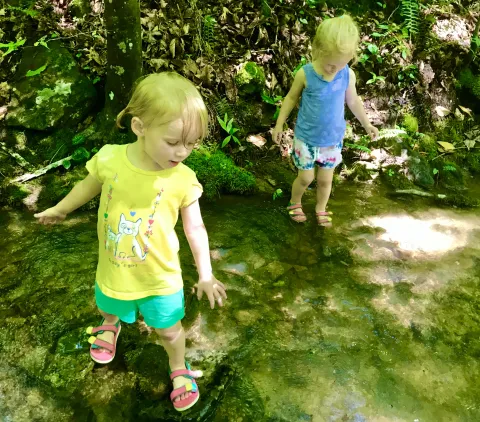Teach your children well … outside

Photo by Steve Roark
By Steve Roark
Volunteer, Cumberland Gap National Historical Park
I’m going to sound like an old cranky dude for beginning a sentence with the time-worn phrase, “when I was young, I would…” fill in the blank.
Well, so be it.
When I was young, we played outside, not necessarily because we wanted to but because that was all there was to do, and our mom often shoved us out the door.
I got exercise and was appreciating natural systems like forests and streams and didn’t know it, I just thought I was having fun.
Kids today are the most technologically connected generation ever, but also the most disconnected to the natural world. That bodes ill for their long-term health and happiness, as well as the health of the planet.
You may have heard the term Nature Deficit Disorder, a catchy name for the social trend of kids not spending enough time outdoors.
They stay indoors because parents are trying to keep them safe (“stranger danger”), or because there are limited natural places to go (not a problem in our area), or mostly due to the “lure of the screen:” smart phones, television, computers, and video games. Being outside is down, staring at screens is way up, with the average American child spending an average of 44 hours per week on some form of electronic media. Kids aren’t even spending much time in their own backyards.
I hope it’s obvious that this has repercussions. Childhood obesity is way up. Studies are showing that kids who don’t get nature time are more prone to anxiety, depression, attention-deficit problems and reduced creative thinking skills.
Plus, they are flat out missing the sense of wonder and joy that being out in nature can bring. I believe that enjoying nature is hard-wired in our souls.
If you’ve stopped to enjoy a pretty sunset, paused to listen to a bird singing, been thrilled by a deer running across the road or driven around to look at the fall colors, you proved it. Somebody even gave it a name: the Biophilia Hypothesis, the instinctive bond between humans and nature.
Besides impacting health and happiness, there is another negative result of nature disconnection that, as a natural resource person, I find disturbing. If kids don’t know the natural world, they may not think it’s important enough to take care of when they reach adulthood and able to express opinions, vote and make choices.
There’s a saying that expresses this pretty well: “In the end we will conserve only what we love; we will love only what we understand; and we will understand only what we are taught.” ― Baba Dioum
Parents sway a lot of influence whether you believe it or not, so give kids a chance to develop an appreciation of the natural world. Get them outside more.
Go to parks, hike trails, fish, hunt, lay on your back and look at clouds, take up bird watching, find wildflowers in your backyard—doesn’t matter what.
Let them see, touch, smell and feel stuff. It’s good for them and does wonders for parent/child relationships.
- Log in to post comments